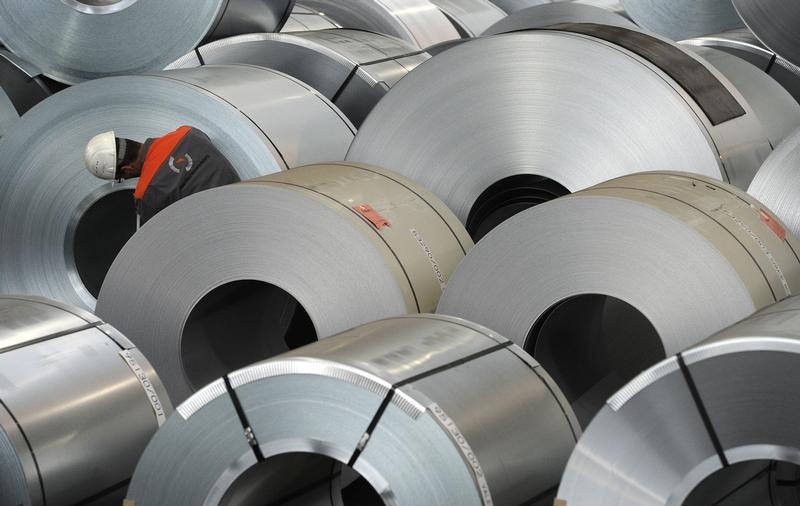* Coking coal falls from record high after exchange hikes margins
* China iron ore imports fall to lowest since February
* China steel exports lowest since March 2015 - ANZ (Recasts, adds Dalian exchange hiking fees, updates prices)
By Manolo Serapio Jr
MANILA, Nov 8 (Reuters) - Coking coal futures in China dropped nearly 3 percent on Tuesday, retreating from a record high after an exchange raised fees to tame sharp gains, and slashing gains in steel and iron ore prices.
The Dalian Commodity Exchange said it will raise minimum margins for coke and coking coal to 11 percent from Tuesday. It will also double non-intraday transaction fees for both commodities from Wednesday. coking coal DJMcv1 closed 2.8 percent lower at 1,422.50 yuan ($210) a tonne after rising as much as 5.5 percent to a record high of 1,544 yuan.
Coke DCJcv1 , which climbed as much as 6 percent to its loftiest since February 2013, ended 0.5 percent firmer at 1,965.50 yuan per tonne.
Coking coal surged 10 percent on Monday, leading a broad rally in Chinese commodities from base metals to eggs. relatively modest losses in coking coal suggests a shortage of supply of the steelmaking commodity in China may continue to support prices, traders said.
"I don't see any immediate relief to the coal sector," said a Shanghai-based trader.
Coking coal's decline curbed gains in steel and iron ore.
Dalian iron ore DCIOcv1 closed up 2 percent at 519 yuan a tonne, off a session high of 529.50 yuan.
"Mills are making money, they're able to increase steel prices and sustain those steel prices," said the Shanghai trader. "They will continue to produce."
Construction steel product rebar on the Shanghai Futures Exchange SRBcv1 finished 1.3 percent higher at 2,836 yuan per tonne after peaking at 2,933 yuan, its strongest since September 2014.
Spot iron ore prices have taken their cue from firmer futures, with the 62-percent benchmark .IO62-CNI=SI rising 3.2 percent to $66.80 a tonne on Monday, the highest since April 21, according to The Steel Index.
The gains in futures came despite data showing that China's iron ore imports last month fell to the lowest since February, at 80.8 million tonnes, which some analysts say may have been due to shipment disruptions rather than weak Chinese demand. shipments from top supplier Australia remaining strong last month, the decline may have been due to "some issues with Brazilian exports," said ANZ commodity strategist Daniel Hynes.
"I suspect there's also been a little bit of destocking as well with the buildup in inventories at the ports over the past couple of months.
"While imports may continue to weaken slightly coming into the year-end, I think we'll find year-on-year hold up pretty well," said Hynes.
China's steel exports fell to 7.7 million tonnes from 8.8 million tonnes in September.
Hynes said the last time exports reached 7.7 million tonnes was in March 2015 and the drop may be due to stronger domestic steel demand.
"The short-term pickup in fixed-asset investment and infrastructure and real estate sector has certainly taken some of the steel that had been earmarked for exports," he said.
($1 = 6.7757 Chinese yuan)
